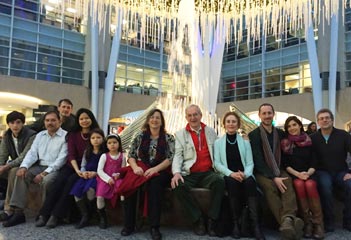Turning the Spotlight on
the Editor

Martin McKneally and family gathered at Christmas
In this interview I am delighted to have the opportunity
to shine the spotlight on the Editor of the Surgical
Spotlight, Dr. Martin McKneally. Martin’s family is the
most important part of his life. His wife Deborah, who
was a professional violist, currently acts as the CFO,
COO and managing partner and editor at their home
in North Toronto, otherwise known as the “Ravine
Research and Education Center”. They have 4 children,
and are close with all of them and their spouses as well
as his three grandchildren. He feels fortunate they are all
leading healthy and productive lives. Ellen is a retired
computer scientist and now runs a horsefarm in Georgia.
Chris is a social worker and musician in Maine. Luke is
an environmental architect in Boston. Greg is a filmmaker
and artist in London, England. He is delighted
that they are all coming home for the holidays and will
be stacked like firewood on inflatable beds!
Q: How did your career evolve to the point where
you were recently awarded the prestigious Joint
Center for Bioethics Distinguished Service Award?
A: It was all a conspiracy to make me keep working. I
have been retired from clinical surgery for 20 years. But
I had been interested in bioethics since I was a resident
and so teaching and learning bioethics has been tremendous
fun. Teaching bioethics to residents at U of T was
basically an assignment from Peter Singer so I selected
excellent teachers in all the residencies. I coached them
and also did a lot of work with the residents figuring out
what the best way of teaching this stuff was. I learned a
lot as you do from students and then that “morphed”
into teaching graduate students. Having to explain
things to graduate students brought a new dimension
to my life. It became a fun hobby to learn how to make
bioethics interesting and memorable.
Q: Is it unusual for a surgeon to do ethics?
A: Surgeons are practicing ethicists throughout their
career. They make decisions about life or death, allocation
decisions, and so it’s a very easy transition to bioethics.
You have to learn a new language of sorts, but
the practical aspects are absolutely intrinsic to surgical
practice. I love teaching surgical residents because when
I ask them if they have “cases like this”, they say: “Yeah,
last night!”
Q: What is the future of ethics?
A: I think it will be part of the standard curriculum
and culture, in the way that the language and culture of
physiology and genomics have become part of the formal
curriculum.
Q: If you had to give three pieces of advice for
younger surgeons what would they be?
A: Well most are younger than I am at the age of 80.
- Keep your receptors up. Keep listening and learning.
Learning is not a task it is the real fun in surgery.
- Think about role models that surround you. Even
the bad ones are helpful as they draw a clearer edge
on ideals and virtues you are trying to develop. Keep
thinking “how would I handle this case” to learn how
to be a better physician and surgeon. This is also true
about teaching, pay attention to their methods.
- Think reflectively, not just practically (e.g. do we need
the cell saver?). What are our and the patient’s goals
here? What are we accomplishing? Thinking reflectively
is more about the principles and aspirations of
the patients and the healthcare team. This doesn’t get
extensively discussed in our formal training particularly
in our early careers.
|
Q: What are your future goals?
A: To expand the surgical ethics program further, and
I am very encourage by young people like you, Mark
Camp, Ryan Snelgrove and more senior people like
Mark Bernstein in the ethics tribe. I’d like to make it
a signature activity of the Department of Surgery, in
the way that lung transplantation has become identified
with the Department of Surgery. I’d like to make
the fellowship in surgical ethics a standard part of our
Postgraduate program. I’d also like to continue to do
research that illuminates and helps surgeons deal with
the ethical quandaries they face in surgical practice.
VANITY FAIR PROUST QUESTIONNAIRE:
Q: What is your idea of perfect happiness?
A: When all my kids come to celebrate Christmas
tomorrow.
Q: What is your greatest fear?
A: I’m not very fearful. I’ve survived long enough so I have
an untroubled view of the circumstances of life.
Q: Which living person do you most admire?
A: Deborah McKneally.
Q: What is the trait you most deplore in others?
A: Self- agrandisement and inappropriate emphasis on
individual worth and contributions.
Q: What is your favorite journey?
A: Walking in the ravine behind our house, which I do
daily.
Q: When and where were you happiest?
A: Now.
Q: What do you consider your greatest achievement?
A: My family.
Q: If you were to die and come back as a person or
thing, what do you think it would be?
A: An undifferentiated Canadian child. It’s been so
much fun learning what I would be when I grew up.
Q: What is your most marked characteristic?
A: Enthusiasm and gratitude.
Q: Who are your heroes in real life?
A: Too many to enumerate.
Q: How would you like to die?
A: Quietly at home.
Q: What is your favorite hobby?
A: Poker with my group of surgeons and bioethicists.
Q: What is your favorite book?
A: Usually the one I’m reading at the time. Currently
it’s “Transplant” by John Elefteriades.
Karen Devon, Assistant Professor,
Department of Surgery and Joint Center for Bioethics,
University of Toronto
|